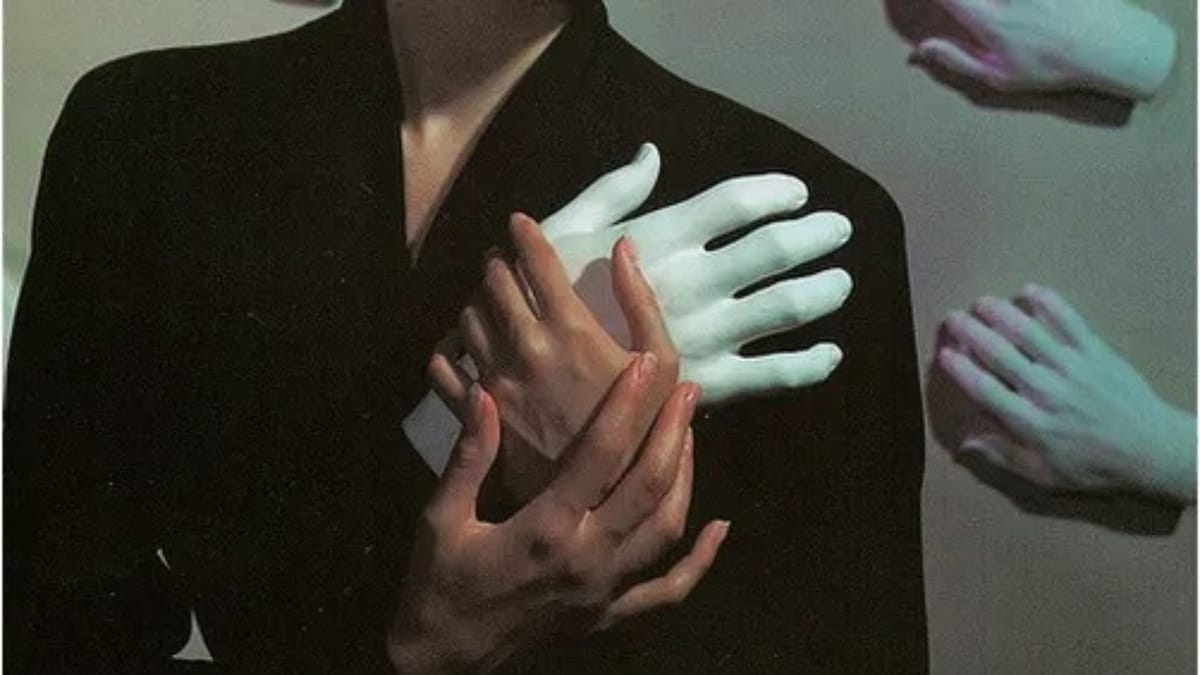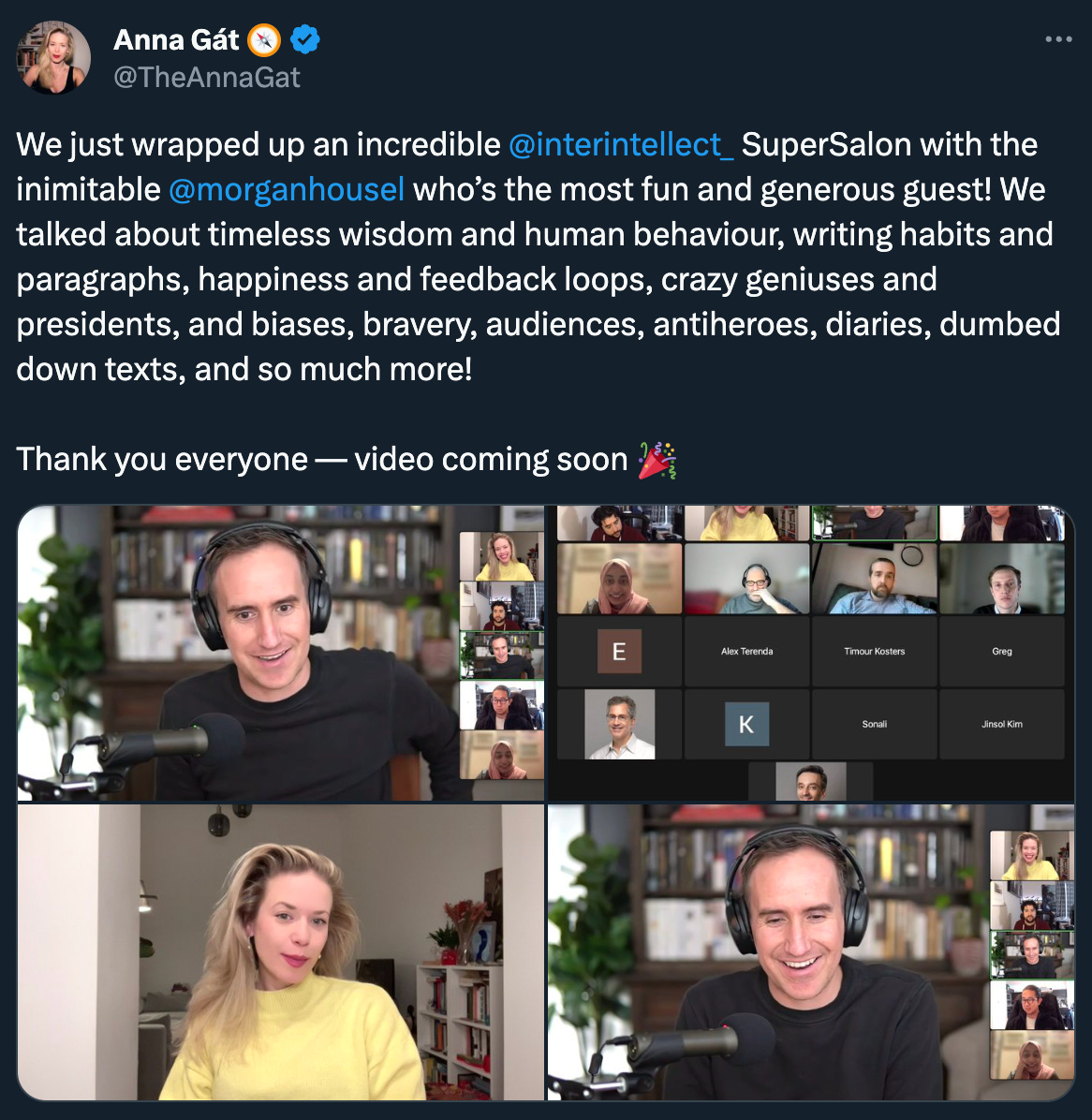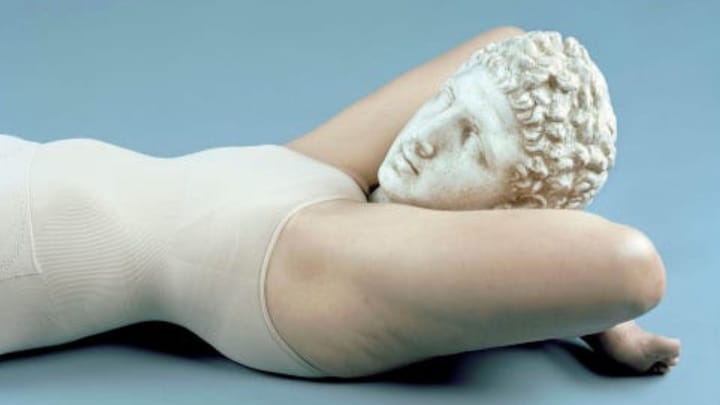Anna Gát: What to Read This Weekend #48

Thomas Kuhn, Thomas Piketty, American academia, American antisemitism, Danish fairy tales, baby heart transplants, autism, fertility, Impressionism, agency, CIA, galaxies, coeds, cancer, nerds & more
Subscribe to Anna’s weekly digest on the Interintellect Substack.
Evening, folks,
This is the last Friday Digest before my New York trip. Busy days with the Interintellect team.
I’ve just wrapped up saloning with Morgan Housel whose new book Same As Ever I greatly enjoyed…

On Interintellect, we’re starting, among many other things, The Wealth Of Nations Reading Group (“Read and discuss the most important work of economics in the Western canon. Hosted by Ben Landau-Taylor.”), come and join us!
And now lets’s dive into my reading selection for your weekend. Hope you’ll enjoy the pieces and will let me know what you think x Anna
The end of a melody is not its goal. — Nietzsche
The Liberality of Liberal Education
Every university student faces these questions of ultimate value, meaning, and purpose, because all equally suffer from the human condition. Every student will experience anger, rage, grief, and yes, death. Every student will want loving friendships, encounters with awe and beauty, and experience the thirst for knowledge and understanding. In short, every student will need to be equipped to face their own humanity and to help others face it. But we are no longer investing in this project.
- Jennifer Frey; Fusion
The Disenchanted Normie
Here In Avalon, Tara Isabella Burton’s third novel (and fifth book), is an exploration of this tension: between the “insane” and the “well-adjusted,” the secular and the enchanted, rationalistic and magical thinking, the self-selected and the gratuitously received.
- Stephen G. Adubato; RealClear Books & Culture
Don’t Panic, It’s Just Cancer
The prognosis is good. So far, there is every reason to expect a full cure. I had my final dose of chemotherapy on December 26, 2023, but I still have to get a final scan in February to confirm that the cancer is gone. After that, assuming the cancer is gone, I enter extended monitoring for years.
- Daniel Golliher — my dear friend whom I can’t wait to see in NYC!
The Case for Cyborgs
Why, then, does it feel like so much of the conversation is focused on artificial intelligence that automates or replaces what we do, rather than augments our abilities? One theory is that capitalist pressures have outweighed the most acute evolutionary ones, and the lure of creating the same goods with fewer humans is a strong one. But I think it’s also because humans are messy—we don’t fully understand how our biological bodies give rise to our minds and consciousness.
- Alice Albrecht; Every
Invisible Ink: At the CIA’s Creative Writing Group
“The last thing in the world I’d want to write about is this place,” Vivian said at the door. “I can’t imagine anything more boring.”
- Johannes Lichtman; The Paris Review
The Pythagoras myth
Is Pythagoras the father of modern mathematics? In popular perception he was the source of the famous theorem about right-angled triangles: The Square on the Hypotenuse is equal to the Sum of the Squares on the Other Two Sides. It’s a great result – serious mathematics indeed – but the theorem had been known for 1,000 years or so.
- Mark Ronan; Engelsberg Ideas
Resurrection of the Author
As much as he is interested in history and in poems’ capacity to control it, he’s also interested in looking forwards, with hopefulness, at the possibility and power of change.
- Declan Ryan; Times Literary Supplement
How much of modern academia is waste?
My defense of the university system from its conservative critics was always based on the research that universities do… Research productivity, as measured by the amount of total factor productivity growth relative to research spending, has been going steadily down.
- Noah Smith
The reality of the Danish fairytale
But to pine for a society like the Danish purely on the basis of the benefits is delusional. These benefits are fenced by a myriad of compromises and obligations. The fawning, superficial adoration that American liberals usually bestow on Danish society rarely seems to dwell on these protective factors, so let’s spend a minute doing so.
- David Heinemeier Hansson
The flight of the Weird Nerd from academia
Confronted with this altered habitat, The Nerd often finds itself in a state of distress and confusion. Its intrinsic motivation clashes with the newly imposed corporate-like order and the demand for conformity, leading to frantic efforts to assert its natural tendencies. Unfortunately, these efforts are often met with resistance or outright rejection…
- Ruxandra Teslo
I Was the Villain in My Relationship
At the time, I had a narrative to excuse my behavior. It wasn’t fair that life was so easy for him, I told myself. Didn’t he have it so good? He didn’t have to scheme his way into a place to stay, and most of his friend group seemed to have arrangements like his too. Empty flats would magically appear, or parents or uncles they could stay with. There was a difference between us that I felt he would never understand. This was just what life was like, I reasoned. Some of us had no choice but to use other people to get the things we needed or wanted. It was a comfortable story I had constructed. There I was, the plucky underdog, my circumstances akin almost to a structural ill.
- Rachel Connolly; The Cut
Paradigms Gone Wild
The Structure of Scientific Revolutions was just 172 pages of lightly footnoted text, mostly accessible to general readers, liberally salted with stick-in-the-mind aphorisms: a remarkable merger of intellectual and literary virtue, small but perfectly formed. Kuhn regarded it as little more than a ‘highly schematic sketch’ of a much longer and more professional monograph that he had in mind for the future.
- Steven Shapin; London Review of Books (check out our relevant Interintellect series!)
How to Have Good Taste
The more you sample, the better and broader your taste will be. The more you stick to what already speaks to you, the more limited and narrow your taste.
- Henry Oliver
How to be More Agentic
If you aren’t trying to get real feedback from people who know you, you’re cooking without tasting.
- Cate Hall

Interintellect member Arki’s very Interintellect-y art
The Paradox of Apology — Or, why everyone believes in miracles
Even when you know that you are the one who is in the wrong, and that you mistreated someone you’re close to, and that you’d really like to repair the relationship, it often feels as though there is some psychological block standing between you and the step you know you need to take toward reconciliation. Faced with your victim, you struggle to push the apologetic words out of your own mouth. What blocks apology? The standard answer is that we are selfishly reluctant to own up to wrongdoing. I think that is not right. What blocks the would-be apologizer is something different from egoism or stubbornness.
- Agnes Callard; The Point
In The Counterlife of Autism
Autism, my son Misha’s primary diagnosis, constitutes “a whole mode of being” and “touches on the deepest questions of ontology,” as the neurologist Oliver Sacks wrote in 1995. If this is so, then the question is how people like Misha perceive the fundamental entities and properties of reality. “The ultimate understanding of autism may demand both technical advances and conceptual ones beyond anything we can now dream of,” Sacks wrote. He urged neurologists to limit the boundaries of “radical ontology” by shucking off their habits of detachment and accompanying their subjects in society. “If we hope to understand the autistic individual,” he contended, “nothing less than a total biography will do.”
- John Summers; Liberties
Patrick McKenzie on Navigating Complex Systems
“I try to tell sophisticated people that other people who they have a high degree of regard for — some sophisticated people, for whatever reason, have a high degree of regard for me — even people you have a high degree of regard for sometimes make very large decisions based on very small amounts of data or very small amounts of consideration with regards to that decision, and therefore you should update your world model about that.
Be very careful about saying things like “Oh, the tech industry is so over, haha,” as a joke because it is quite possible that someone will listen to that and just perceive the surface-level meaning of it. And then the tech industry would lose the services of someone who, in expectation, it might very much want to have had the services of in 20 years.”
- Tyler Cowen
3 Core Gender Beliefs
If you want to understand any society, it’s useful to examine three core gender beliefs:
- Men are high status, women are low status.
- Women must be chaste, and stay away from unrelated men
- Marriage and motherhood are paramount; divorce is shameful.
- Alice Evans
Do we really live in an “age of inequality”?
Saez and Zucman, in a response paper, argue that Auten and Splinter are not using the audit data appropriately, and assign less unreported income to the rich than the audit data suggests; in a reply to that reply, Splinter argues that he and Auten use the data perfectly well and that their ultimate conclusions match the audit results. Still another argument, from Brookings Institution researchers William Gale, John Sabelhaus, and Samuel Thorpe, is that the inability of the IRS to detect sophisticated tax evasion should lead audit studies to underestimate how much the rich are evading their taxes, which would be a point in Piketty/Saez/Zucman’s favor.
- Dylan Matthews; Vox
Bounded Regret Algorithm (poetry)
Explore, record, explore,
record, explore, record.
Eventually I learn to limit
the loss. I come to know
where I should not go:
The fire escape, zip codes
with low property taxes,
some drugs, some jobs.
- Zoë Hitzig; The Yale Review
New Books on Deciding Whether to Have Children
“Rather than seeing nonparents and parents as oppositional groups, we invite people to be part of a generational chain,” Ferorelli says. “We’re all in this together. The more broadly we define family, the more we connect with elders and children, the more we respect each other’s rights to a future, the better chance we stand.”
- Pooja Makhijani; Publishers Weekly
What is the Terminal Velocity of an iPhone? (2011)
Well, the Wikipedia page on air drag lists a coefficient of 2.1 for a smooth brick. How is an iPhone not a smooth brick? Essentially it is the same thing, right? There is no reference for that value, but I saw that same thing come up on a few other sites. Either it is an accurate value or everyone is using the wrong value based on Wikipedia. Why shouldn’t I also use it?
- Rhett Allain; WIRED
How Camille Pissarro Went from Mediocrity to Magnificence
What little prose writing there is that’s associated with Impressionism gives a misleading sense of its ambitions. Baudelaire’s beloved essay “The Painter of Modern Life,” for instance, suggests the role of the painter as flâneur, making images of the modern city in the way the roving street photographer Cartier-Bresson later did. But Baudelaire’s is a purely literary project, and the painters, including even Manet, his supposed model, would actually return again and again to single subjects: a nude in the bath, a plate of asparagus, a haystack. The obsessive series is their sonnet form.
- Adam Gopnik; The New Yorker
Always a crossword — The enduring power of puzzles
My favourite precursor was written in the eighth century by another immigrant and puzzle fan, Alcuin of York. The Disputatio Pippini cum Albino is an educational question-and-answer dialogue, nominally between Alcuin and Charlemagne’s son Pippin. Some of the questions are very short: “What is summer? The painter of earth”; “What is fog? Night in day, a burden to the eyes”. Others become poetic, even philosophical. Alcuin describes Earth as “mother of those who grow, nurse to the living, the pantry of life, she that devours all”. But Pippin is allowed some wit, occasionally answering a riddle with another question. When Alcuin asks him what springs up higher when you take away the head, he responds, “go to your bed and you’ll find it”.
- Irina Dumitrescu; Times Literary Supplement again
Neural Correlates of Emotional Resilience
Unfortunately there doesn’t seem to be a noninvasive technique to directly and specifically inhibit neural activity in the amygdala. (It’s in the middle of the head; rTMS can inhibit bits of cortex but it won’t go that deep.) Are there other regions of the brain whose activation would inhibit the amygdala? Well, maybe so!
- Sarah Constantin
OpenAI and journalism
- We collaborate with news organizations and are creating new opportunities
- Training is fair use, but we provide an opt-out because it’s the right thing to do
- “Regurgitation” is a rare bug that we are working to drive to zero
- The New York Times is not telling the full story
- OpenAI
Progress studies as a moral imperative (2019)
First, most people today don’t appreciate progress. And how could they? They don’t learn about it in school: it falls between the cracks of history and science classes. They don’t learn about it from the news media, who are subject to strong negativity bias (“if it bleeds, it leads”). They don’t get it from popular culture, which since the 1950s has increasingly turned away from optimistic visions of the future and toward dystopian ones.
- Jason Crawford
The Forgotten Half of History: Why Women Philosophers Matter
This “stolen history” must be brought back into our philosophical and scientific tradition. We need to know the names of these women philosophers. Would this change anything? Yes indeed! It can be argued that the inclusion of women would completely change our moral ideas and everything else from there.
- Ruth Hagengruber; De Gruyter Conversations
On the Serious Business of 19th-Century Fairy Paintings
If a painter put wings on an image of a naked girl, then she was no longer human, and so exempt from the rules of propriety that governed representations of the so-called real world—she could fly half-naked, if the painter so desired.
- Jennifer Higgie; Literary Hub
The Tipping Point: The Subtle Psychology and Economics of Taxi Fares (2021)
As payment screens have replaced tip jars and outstretched palms, Donkor’s findings have implications for cafes, restaurants, delivery services, or any industry where workers rely on tips to supplement their income. Tip menu suggestions can “actually increase the wages of workers without necessarily making life terrible for consumers or taking money away from them,” Donkor says. “In fact, they don’t have to do as many computations; we’re making it easy for them to do these calculations. So this is a win-win situation.”
- Shinhee Kang; Stanford Business
Europe’s Political Stupor (2020)
The EU has arrogated ever-more power over people’s lives, in particular in the realm of economic policy. But there is no EU presidential election in which the voters are offered a clear choice about the future of the EU.
- Leopold Aschenbrenner
Why pushing STEM majors is turning out to be a terrible investment
Employers facing STEM shortages should bend over backwards to keep their scarce talent. Instead, research finds that STEM employers maintain unwelcoming environments for older workers as well as women and underrepresented minorities.
- John David Skrentny; Los Angeles Times
Why Parents Struggle So Much in the World’s Richest Country
The job of raising children is simply different in the U.S. It comes with fewer assurances and requires navigating a level of precarity that is unique in the developed world.
- Stephanie H. Murray; The Atlantic
Why I Quit My Dream Job at MIT
Though I cringed as I read these faculty letters, and shuddered as I walked by protests on campus, nothing has hurt more than watching the Israeli and Jewish students—who comprise fewer than 6 percent of the MIT student body—suffer.
- Mauricio Karchmer; The Free Press
Constructor Theory of Information and Its Application in Hybrid Quantum Systems
Contrary to Hume’s argument on the unobservable nature of causation, Deutsch aligns with Popper’s view, treating scientific theories as conjectured explanations, not inferences from evidence. In this perspective, observation serves as a test for theories, not a means of validation, rendering Hume’s argument irrelevant within this framework.
- Feroz Ahmad
Toddler thriving after world’s first partial heart transplant
“It’s probably one of the biggest advances in congenital heart surgery in the last 40 years,” said Turek in November 2023. “It’s a wonderful setup where two children can benefit from one initial gift.”
- Kristin Houser; Freethink
Stuck in a Tokyo Hotel, the Beatles Divided a Canvas Into Quarters and Started Painting
After the Beatles finished painting, they removed the lamp from the center of the canvas, signed their names in the unfinished circle and gave the piece to the official Beatles Fan Club in Japan. For years, the piece went untitled.
- Julia Binswanger; Smithsonian Magazine
“It’s too late for the Jewish state”
“No doubt that we must reach a point in which Israelis will understand that the [current situation] is impossible [and] they will have to pay such heavy prices for the status quo that they will need a change.”
- Bruno Maçães and Gideon Levy; New Statesman
Neuroscience is pre-paradigmatic. Consciousness is why
In all those fields Kuhn mentioned, there were papers (or their historical equivalent) being published, experiments being done, all right before the paradigm revolution. The tell of being ripe for revolution is both deep troubles and that there is an unexplained anomaly that haunts the field. And there is an obvious anomaly in neuroscience: consciousness.
- Erik Hoel
Huge ring of galaxies challenges thinking on cosmos
The Big Ring is by no means the first likely violation of the cosmological principle and so suggests that there is another, yet to be discovered, factor at play.
- Pallab Ghosh; BBC
Misunderstanding antisemitism in America
Although young people hold more negative views of the Israeli state and its politics compared to older Americans, most nonetheless hold positive views of the Israeli people. Only 17 percent of Americans under 30 hold unfavorable views of Israelis but positive views of Palestinians.
- Musa al-Gharbi; Slow Boring
Kate doesn’t want Prince George to go to Eton – and for once I agree with her
This is an entirely new sensation to me, agreeing 100% with Kate. I went to an all-girls’ private school in London in the 80s. It comes up every now and then on social media, the smoking gun of the hypocritical lefty, that this was a very expensive education. My defence is always that, whatever the age is of political responsibility, it’s definitely not 11; come at me when I send my own kids to private school, which I wouldn’t. But the real reason I have no trace of shame about it is that I hated it so much, and came out of it so completely horrible, and it took so many years to rewire some basic trust in humanity, that I just cannot conceive of it as a privilege.
- Zoe Williams; The Guardian
Writing in two directions
At that time, there was no evidence that anything serious or genuinely literary could be accomplished with palindrome writing. Still, out of some combination of stubbornness and eccentricity, and with no real example to follow, I kept working at it. Eventually (decades later), something happened, and I reached a point where reversibility became so natural to me that I began to think of it as my first language. After what had seemed like an unusually long apprenticeship, I had achieved such proficiency in two directions that I felt as if I could compose a palindrome on just about any subject.
- Barry Duncan; MIT Technology Review
Our Neo-Romantic Rebellion: A very weird AI prediction
We’re starting to find the right balance with our machines. We’re happy to give AI’s logic and calculation. In return, we will reclaim the paradoxes at the heart of the human journey: between reason and emotion, the conscious and subconscious, the animal and the divine. This is the Neo-Romantic rebellion. We seek the sacred.
- R.B. Griggs
Some have asked for pics of the Revolutionary War fort we discovered inside an old plantation house in West Virginia — incredible thread!
Also, the inside of the house was full of interesting things we found. Basically an entire family’s belongings from the mid 19th century through 2016 were still in the house.
- The Civil Rights Lawyer
Thank you for reading!
Email me at anna@interintellect.com.
Attend our public online salons here. Join our community and find more great stuff to read and thoughtful people to discuss it with here.



